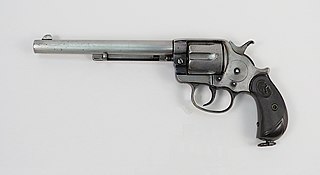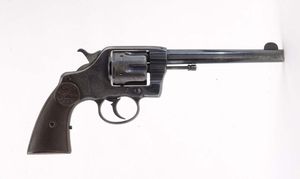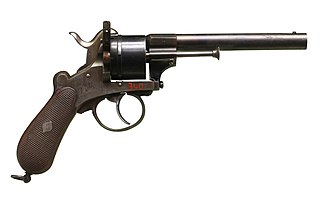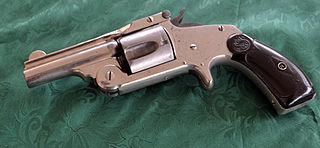 W
WThe Beaumont–Adams revolver is a black powder, double-action, percussion revolver. Originally adopted by the British Army in .442 calibre in 1856, it was replaced in British service in 1880 by the .476 calibre Enfield Mk I revolver.
 W
WThe British Bull Dog was a popular type of solid-frame pocket revolver introduced by Philip Webley & Son of Birmingham, England, in 1872, and subsequently copied by gunmakers in continental Europe and the United States. It featured a 2.5-inch (64 mm) barrel and was chambered for .442 Webley or .450 Adams cartridges, with a five-round cylinder. Webley produced smaller scaled .320 Revolver and .380 calibre versions later, but did not mark them with the British Bull Dog name.
 W
WThe Colt M1877 was a double-action revolver manufactured by Colt's Patent Fire Arms from January 1877 to 1909 for a total of 166,849 revolvers. The Model 1877 was offered in three calibers, which lent them three unofficial names: the "Lightning", the "Thunderer", and the "Rainmaker". The principal difference between the models was the cartridge in which they were chambered: the "Lightning" being chambered in .38 Long Colt; the "Thunderer" in .41 Long Colt. Both models had a six-round ammunition capacity. An earlier model in .32 Long Colt known as the "Rainmaker" was offered in 1877.
 W
WThe Colt M1878 is a double-action revolver that was manufactured by Colt's Manufacturing Company from 1878 to 1907. It is often referred to as the "Frontier" or the "Double Action Army" revolver. A total of 51,210 Model 1878 revolvers were manufactured from 1878 to 1907, including 4,600 for the US Ordnance Department. These are known as the "Philippine" or "Alaskan" models.
 W
WThe Colt M1892 Navy and Army was the first general issue double-action revolver with a swing out cylinder used by the U.S. military.
 W
WThe Enfield No. 2 was a British top-break revolver using the .38 S&W round manufactured from 1930 to 1957. It was the standard British/Commonwealth sidearm in the Second World War, alongside the Webley Mk IV and Smith & Wesson Victory Model revolvers chambered in the same calibre.
 W
WThe Enfield Revolver was a self-extracting British handgun designed and manufactured at the government-owned Royal Small Arms Factory in Enfield, initially in the .476 calibre.
 W
WThe Lefaucheux M1858 was a French military revolver developed for the navy, chambered for the 12 mm pinfire cartridge, and based on a design by Casimir Lefaucheux and his son, Eugene. The 1854 model was the first metallic-cartridge revolver adopted by a national government; the 1858 was the first variant fielded It was first issued in 1858 by the French Navy, and though never issued by the French Army, it was used in limited numbers by the French Cavalry during their 1862 deployment to Mexico. The 1858 was later upgraded in the late 1860s as the Lefaucheux de Marine 1870. It was accepted by the French Navy, but only 150 copies were delivered by 1872. Models of the 1858 were also purchased by Spain, Sweden, Italy, Russia, and Norway. Most were produced either at the state arsenal Manufacture d'armes de Saint-Étienne (MAS), Liège, Belgium, or local producers under license. The revolver was sold to the civilian market as well. Most military models were produced only with single-action, whereas civilian models were made primarily with double action.
 W
WThe Model 1892 revolver is a French service revolver produced by Manufacture d'armes de Saint-Étienne as a replacement for the MAS 1873 revolver. It was the standard issue sidearm for officers in the French military during the First World War.
 W
WThe Nagant M1895 Revolver is a seven-shot, gas-seal revolver designed and produced by Belgian industrialist Léon Nagant for the Russian Empire.
 W
WRewolwer Nagant wz. 30 and wz. 32 were two Polish derivatives of the Nagant M1895 revolver. They were almost identical to the Soviet variants with only minor differences in weight, length and sights design.
 W
WThe Norinco NRP9 was introduced at IWA in 2014. It is a double-action revolver with a transfer bar and external manual safety. The NRP9 is chambered in a proprietary cartridge similar to .38 S&W, which is designed to prevent unauthorized criminal use.
 W
WThe OTs-38 Stechkin is a 5-shot, double-action revolver, in production and service since 2002, chambered in the silent 7.62×41mm SP-4 cartridge.
 W
WThe Smith & Wesson Model 2, also referred to as the Smith & Wesson .38 Single Action, was Smith & Wesson's first .38 caliber revolver. Chambered in .38 S&W, its cylinder held 5 shots. The single action version was produced in three varieties from 1876 through 1911, with total production exceeding 223,000.
 W
WThe Smith & Wesson Safety Hammerless or Smith & Wesson New Departure is a double-action revolver that was produced from 1887 to 1940 by Smith & Wesson. Based on the Smith & Wesson Model 2 double-action design, the revolver incorporated an internal hammer and an external grip safety on its back-strap. It was chambered in .32 S&W and .38 S&W calibers; these revolvers were discontinued prior to World War II, being eclipsed by the stronger hand ejector models.
 W
WThe Webley Revolver was, in various marks, a standard issue service revolver for the armed forces of the United Kingdom, the British Empire and the Commonwealth, from 1887 to 1970.